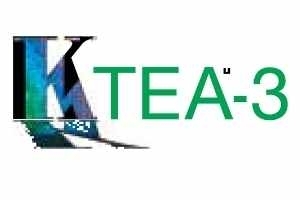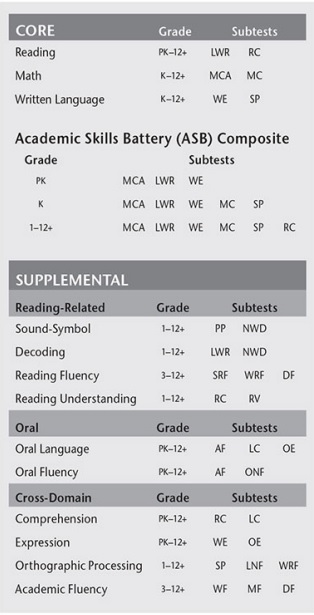Description
Kaufman Test of Educational Achievement Third Edition (KTEA™-3) is an individually administered battery that provides in-depth assessment and evaluation of key academic skills.

Kaufman Test of Educational Achievement Third Edition (KTEA™-3) is an individually administered battery that provides in-depth assessment and evaluation of key academic skills.
Kaufman Test of Educational Achievement Third Edition (KTEA™-3) is an individually administered battery that provides in-depth assessment and evaluation of key academic skills.
Alan S. Kaufman, PhD, Nadeen L. Kaufman, PhD
Overview:Individually administered battery that provides in-depth assessment of key academic skills
Age Range:Individuals 4:0–25:11
Administration:Q-interactive® (digital) or paper-and-pencil
Scoring Option:Q-global™ (web-based) or manual scoring
Empower all your students to succeed and receive a deeper understanding of achievement gaps with the new KTEA-3. This comprehensive assessment of key academic skills maintains all the important features of the KTEA-II and offers a wealth of exciting updates for targeted interventions.
Special education teachers, school psychologists, educational diagnosticians, and other professionals use this tool to help:
Subtests
Phonological Processing (PP)
Math Concepts & Applications (MCA)
Letter & Word Recognition (LWR)
Math Computation (MC)
Nonsense Word Decoding (NWD)
New! Writing Fluency (WF)
New! Silent Reading Fluency (SRF)
New! Math Fluency (MF)
Reading Comprehension (RC)
Written Expression (WE)
Associational Fluency (AF)
Spelling (SP)
Object Naming Facility (ONF)
New! Reading Vocabulary (RV)
Letter Naming Facility (LNF)
Listening Comprehension (LC)
Word Recognition Fluency (WRF)
Oral Expression (OE)
Decoding Fluency (DF)
Composite Structure

KTEA–3 error analysis normative data provided the basis of research for 13 articles to be included in a double special issue of the Journal of Psychoeducational Assessment (January-February, 2017) called “Analysis of Student Errors in Reading, Writing, and Math: Implications for Assessment and Intervention.” These articles stem from a core belief that error analysis is a critical step for understanding how a student learns and needs to be taught. Unlike standard scores and percentiles, error analysis data provide information about level of mastery for specific skills and reflects the specific processes that mediated performance at the item level. Several of the studies investigated whether patterns of academic errors differ between special groups (e.g., students with intellectual disabilities, giftedness, learning disabilities, attention-deficit/hyperactivity disorder) and between groups of students with specific cognitive profiles associated with learning problems—such as high fluid reasoning paired with low memory or speed. The research described in this special issue of Journal of Psychoeducational Assessment focuses on patterns of errors in and across academic domains on the KTEA–3, revealing valuable insights for improving assessment and instruction.
The KTEA-3 offers the benefit of normed error analysis and much more. Learn more here
PODCAST: Introduction to Special Issue and to KTEA-3 Error Analysis
KTEA-3 Parent Report Sample
KTEA-3 Score Report Sample
KTEA-3 Growth Scale Value Charts
Q-global is Pearson’s new scoring & reporting system that replaces the ASSIST software program. There are two options available to you when using Q-global.
The first option is to pay per-report. Customers who administer the KTEA-3 only a few times each year, or those who want the flexibility to pay only as the assessment is used, may prefer this option.
The second option is to select an “unlimited use” subscription, where one user of the KTEA-3 gets unlimited scoring and reporting for one year, three years, or five years. This may be a better option for customers who administer the KTEA-3 several times each year—and don’t want to worry about keeping track of their report expenses.
Two pricing options are now available for KTEA -3 scoring and reporting on Q-global. In addition to the current per-report price, there is now an unlimited-use scoring and reporting subscription.
Important note: Each subscription is per user for the KTEA-3 only and will begin on the date of order processing unless otherwise requested.
Q-global/Windows 10 and Audio Files:
Software is compatible with Windows (XP, Vista, 7, 8, 10) & macOS – up to and including High Sierra.
The audio files are located on the KTEA-3 USB Flash drive.
If you are taking a test in Q-global and are having difficulty hearing the audio (from the USB flash drive), please follow the following steps:
Note: If this solution does not solve the problem, please contact our technical support department by phone for more assistance at 080-46336656
Presenter: Adam Scheller, Ph.D., Senior Educational Consultant with Pearson Clinical Assessment

School districts across the country have adopted new and modified old(er) special education evaluation processes in line with the requirements outlined in IDEIA 2004. Since this revised legislation opened the door for schools to use several different means to qualify students with special education needs, we have witnessed an explosion of RTI programs and a subsequent decline in discrepancy-model usage. However, one area included in the law has received less fanfare, the process of analysing the concordance (and thus discordance) between related cognitive and academic processes. During this one-hour webinar Dr. Scheller will review this process of cognitive hypothesis testing by taking an in-depth look at how to apply widely used assessments such as the WISC-V, KTEA-3, and WIAT-III. Dr. Scheller’s goal in this one-hour webinar will be to help take clinicians to a level of detail and accuracy when forming and testing hypotheses about a child’s patterns of thinking and learning.
Date: May 20, 2016
![]() PDF: Application of Cognitive Hypothesis Testing Using PSW Analysis
PDF: Application of Cognitive Hypothesis Testing Using PSW Analysis
![]() Video: Application of Cognitive Hypothesis Testing Using PSW Analysis
Video: Application of Cognitive Hypothesis Testing Using PSW Analysis
Presenter: Amy Gabel, PhD

During this webinar we will look at a practical and psychometrically sound method for utilizing the Kaufman Test of Educational Achievement, 3rd Edition to successfully screen for academic difficulties, complete a comprehensive assessment for diagnostic purposes, and ultimately monitor the progress of academic interventions and services. We will specifically highlight using the KTEA-3 Brief, KTEA-3, and Q-global Intervention Guide for LD Subtypes to accomplish this goal.
Date: Sep 30, 2015
![]() PDF: Academic Assessment: From Screening to Progress Monitoring
PDF: Academic Assessment: From Screening to Progress Monitoring
![]() Video: Academic Assessment: From Screening to Progress Monitoring
Video: Academic Assessment: From Screening to Progress Monitoring
Presenter: Adam Scheller, PhD

During this one hour overview webinar we will take a look at the (KTEA–3) written language tests. By the end of the session, participants will be able to describe the subtests comprising the reading and writing domains as well as when to compare them to oral language measures, how those tests can be used to help identify strengths and weaknesses, and how to set up effective interventions.
Date: May 22, 2014
Presenter: Adam Scheller, PhD

During this second session of the KTEA-3 Overview Webinar Series, we will look in more depth at some of the changes made to the KTEA that were focused on the qualitative indicators of SLD, the parent/teacher interventions suggested that are based on a student’s KTEA-3 performance, and how the test maps to common core standards. Finally, the session will also briefly give information about upcoming combo reports with WISC-V and KABC-II that can be used to drive LD subtype identification.
Date: Mar 27, 2014
Presenter: Adam Scheller, PhD
